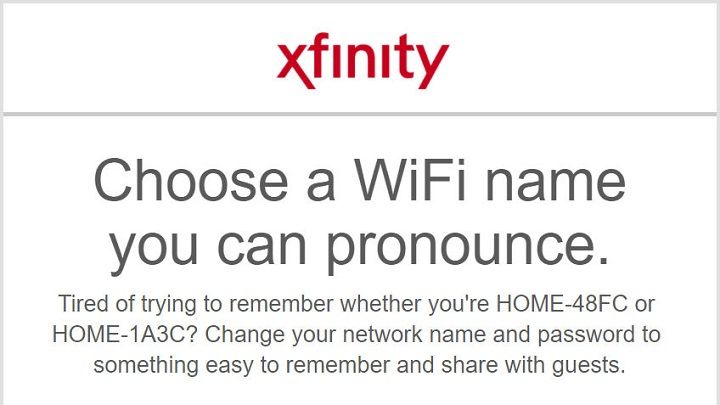The Absolute Worst Advice I’ve Ever Seen in an Email Newsletter

I get newsletters periodically from companies that provide me a service or product – cable/internet, mortgage, utilities, mobile, email, e-commerce sites, etc. For some reason, I don’t unsubscribe to most of them.
Some are amusing for their ineptitude. For some, I’m holding out hope that I’ll someday be the recipient of a promotion that actually has value for my family and me. Maybe the marketing nerd in me is hoping to learn something from a newsletter that’s particularly effective and/or clever.
Then I received this email from Xfinity, a Comcast company. Their emails are typically lame attempts to sell me additional services. Whatever. I expect that.
But this email caught my attention because of the ridiculously terrible advice it offered:
Choose a WiFi name you can pronounce. Tired of trying to remember whether you’re HOME-48FC or HOME-1A3C? Change your network name and password to something easy to remember and share with guests.
Why This Is the Worst Advice Ever
Sweet fancy Moses, have the folks at Comcast not been paying attention to the news? Have they not heard about the security breaches that compromised the personally identifiable information, financial data or medical records of millions of people? Do the words “Russian hacking” not mean anything to them?
And why do many of these breaches occur? Because people use passwords that are easy to remember!
According to a Keeper Security survey of the most common passwords , these are the 10 most popular passwords:
- 123456
- 123456789
- qwerty
- 12345678
- 111111
- 1234567890
- 1234567
- password
- 123123
- 987654321
Know how researchers obtained these passwords? They became public because of data breaches that occurred in 2016! Some of the biggest hacks in the world happen not because of sophisticated technology, but because people use passwords that are easy for hackers to guess.
Further down in the Xfinity email, there’s a how-to guide for updating Wi-Fi settings. Very practical and helpful. Scroll down a little more and there’s a tip for rebooting your gateway to keep it running efficiently, as well as a few options for rebooting. Again, very practical and helpful.
But why in the name of Anonymous would Xfinity suggest that someone should change their network name and password to something easy to remember?
They should be doing the opposite. Suggest creating complex passwords and changing them frequently. Perhaps review and recommend some password management apps. At the very least, recommend that they change the default password.
But no. Let’s tell people it’s okay to use passwords that are easy to remember. In fact, let’s endorse this practice and walk them through the process!
Adding to a Less than Stellar Reputation
Comcast is legendary for its customer service, and not in a good way. I’ve had my own train wreck experiences.
According to the American Customer Satisfaction Index for 2017 , the cable and broadband internet service industry as whole is the most disliked among 41 industries. Despite the incredibly low bar it had established for itself, Xfinity’s customer satisfaction score as a subscription TV service provider somehow dropped six points from the previous year.
Maybe it had something to do with the fact that Comcast was fined $2.3 million last year for charging customers for services they never authorized.
Terrible customer service? Check. Shady business practices? Check. I guess we can add providers of insanely awful advice to the list.
Hell, Xfinity even ran a TV commercial with the same message. Sure, let’s help as many people get hacked as possible!
The Marketing Takeaway
When someone signs up to receive content from you, they expect that content to provide some kind of value. Helpful information. A discount. An inspirational story. A good laugh.
It doesn’t necessarily have to be life-changing, but it should make people feel like time spent consuming your content won’t be wasted. That’s how you build anticipation for your content on a regular basis. That’s how you earn their trust. That’s how you earn their business and referrals.
Maybe the folks at Xfinity think easy-to-remember passwords will make people’s lives easier. And they might, during those times when you need to share network names and passwords with visitors to your home.
For me, that happens a handful of times each year, but maybe I’m just antisocial.
Looking at the bigger picture, Xfinity encouraged possibly millions of people to do something that will put their data and privacy at risk.
That ain’t helpful. That’s not how you build trust. And that sure as hell won’t help you improve a reputation that’s swirling in the bottom of the toilet.
For small businesses, mistakes aren’t likely to be as egregious as this one. Not every piece of content you share with your audience will be expected to set the world on fire.
But all content you share should benefit your audience in some small way, whether it involves educating them, entertaining them, or rewarding their loyalty with a special offer. Fail to meet that expectation and the audience’s perception of your brand may suffer.
In Xfinity’s case, they’re making it easier for very bad people to access the WiFi networks of their own customers. Yikes.
Read the full Xfinity email here.
Subscribe to my blog to receive insights and commentary about copywriting and marketing.
SIGN UP FOR MY BLOG
Thank you for subscribing to my blog!
Oops, there was an error sending your message. Please try again later.
I love testimonials, but only real-world, unfiltered client feedback tells the whole story.
© Scott McKelvey Consulting, LLC. All Rights Reserved. | Privacy Policy | Accessibility Statement

